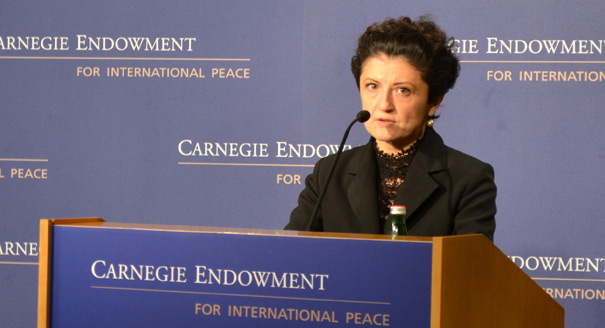Registration
Thank you!
You will receive an email confirming your registration.
Georgia’s new government has said that the rule of law is one of its top priorities. Tea Tsulukiani, the new minister of justice and previously renowned human rights lawyer in Georgia, has embarked on an ambitious program of judicial reform. Carnegie held a conversation with Tsulukiani about her plans and about the state of the rule of law in Georgia. Carnegie’s Thomas de Waal moderated.
A New Departure for Justice in Georgia
- Moving Forward: Being celebratory and making impossible promises are a thing of the past, Tsulukiani said. Distancing herself from her predecessor, she stipulated that she did not expect a grace period from civil society or the international community. Despite what she called a “difficult legacy,” the minister promised to “do what we say and try to say what we do.”
- Bottom Up: The human dimension of these reforms is essential, the minister added. A sustainable system can only be built from the bottom up, with a strong idea of democratic participation based on citizenship. Tsulukiani listed a series of measures as key to building trust in the country’s justice system.
- Amnesty: An amnesty act is under discussion that will pardon some former government officials for non-violent crimes in order to facilitate the investigation and reconciliation process in Georgia, Tsulukiani said.
Measures of Improvement
- Transparency: The minister outlined measures intended to achieve openness and transparency, including the publication of an official law gazette, making access to electronic logging sources free, creating avenues for different parties to contribute to drafting laws, and establishing a structure to deal with the thousands of complaints concerning abuses committed by representatives of the previous government.
- Judicial System: The independence of the courts should be reinforced by a new law regulating the activity of judges. Tsulukiani said her main goal was to depoliticize their appointment and limit the overruling power that Supreme Court judges hold over ordinary judges. Furthermore, she added, the criminal procedure code will be reformed with the goal of strengthening the defendant’s position before the judges and weakening the power of prosecutors.
- Corruption: Tsulukiani acknowledged the previous government’s success in practically eradicating low-level corruption, adding that her government would have to remain prudent. With regard to alleged high-level corruption within the previous administration, she assured that all trials of former officials would be conducted within the frameworks of the Organization for Security and Cooperation in Europe and of the Council of Europe’s Group of States Against Corruption body.
Euro-Atlantic Integration
- Euro-Atlantic Partners: Tsulukiani said she did not reject all projects initiated by Georgia’s Euro-Atlantic partners under the previous government, portraying her mission as one respectful of the rules “universal to all in the Euro-Atlantic family.” She added that the funds provided by the United States and the EU for justice development made her ministry even more accountable and reform bound.
- Commissions: Specifically, the minister referred to continued U.S. and EU participation in commissions and her own warming to the idea of trial by jury, endorsed by the United States.
